The location could well be the heart of historic Vizag, because, just off the Main Road in old Vizag, the grand buildings of yesteryear were gradually constructed. Some like the LMS Telugu Chapel (todays CSI Church), the LMS Vizagapatam High School (todays CBM High School), the Hindu Library, and the Town Hall remain. The Mahal (Maharajah Gajapathi Rao’s mansion) and Kurupam Market have been demolished, and the original cemetery nearby is in ruins. However, one forgotten treasure of Vizag remains and it is the Founding Catholic Church – St Anne’s Cathedral that was constructed in the 1850’s. The cathedrals builder Rev Father Jean Marie Tissot, was Vizag’s premier architect who also built St Aloysius School, the Fort and Waltair Convents, the Ross Hill Chapel and led the establishment of the Catholic faith and modern education for the masses, especially Telugu girls, in the region.
The history of the Catholic Church in Vizag can be traced back to 1770. A Portuguese merchant residing in Vizagapatam named Paul Rosario who gave his house and property to the Theotine Fathers visiting from Goa on the condition that it should be used as a chapel dedicated to St. Anne. This is the very first Catholic Church in Vizagapatam. The Catholics in those days were mostly Europeans and Eurasian, either army personnel or their families.
When the first Missionaries of St. Francis de Sales (MSFS) reached Vizag on 19th February 1846 it was to this St. Anne’s chapel that the Catholic soldiers enthusiastically took them. Monsignor Neyret and Father J M Tissot prepared the plans of the Cathedral; the old chapel was pulled down and on 2nd February 1852 Fr. Tissot laid the foundation stone in the absence of the Vicar Apostolic. On 8th December 1854 Bishop Neyret consecrated the new Cathedral. An early graphic illustration of 1907 was reproduced on the front cover of the French periodical Les Missions.
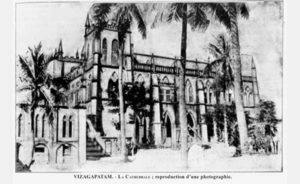
The original building of the St Anne’s Cathedral was a house about 70 feet long with verandahs. The Theotine priests converted the verandahs to rooms and the house to a small chapel. After the last Theotine Fr. D’Attaide, the MSFS priests renovated the building by opening the verandah rooms to the inside of the church and creating a church with three naves. The arrival of a community of nuns of St Joseph of Annecy required a house be built for them in the Fort area but increasing religious activity needed a grand church worthy of the religions standing. They wanted a Gothic style design but there were no architects to consult or materials to build with, but the land around St Anne’s was an ideal site.
Fr Tissot decided to make his own bricks and made 1,200,000 bricks at one-third the cost of the poor quality ones being offered for sale. The local Irish Catholic soldiers made modest donations of Rupees 600 in keeping with their modest means but gave their labour in the manual construction including going up and down to Dolphin’s Nose to reclaim bricks from an old Dutch house. Fr Tissot would draw his plans in the sand to illustrate the dimensions, elevation of the vaults, number of naves, and their width. There would be, in addition to the three interior naves, two outer naves, which would be turn into verandahs. Above these would be a floor, where rooms would be built for the missionaries to stay. These rooms would firstly house the Sister of St Joseph. They would also install sacristies behind the three altars of the sanctuary and at the end of the outer verandahs would run staircases leading to the upper floor. The building would become a grand edifice, sleek in proportions, its pointed windows, graceful interior and grandiose aspect.
In 1858 the Sisters of St. Joseph began to stay in the Cathedral until 1898 when they permanently shifted to Waltair Convent, then newly built. So, for 40 years the Cathedral served as a convent for the Sister’s of St Joseph. Between 1920 and 1935 the cathedral was also a boarding home for boys till it was shifted to St. Anthony’s in 1939.
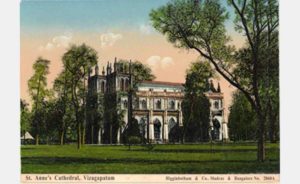
The cathedrals’ Episcopal Consecration is reported in Catholic journals as …’26 July 1891 on the Feast of St Anne, Mgr Jean-Marie Clerc, eveque elu derecevra la consecration episcopale dans son englise cathedrale, le jour de la fete de Sainte-Anne, 26 juilet. Le prelate consecrareur sera Mgr Joseph Coglan, archeveque de Madras et metropolitain. ‘
Reporting on the ordination of Bishop Clerc in 1891, the Madras Mail describes the decorations of the cathedral for the event…’arches of palm branches with ferns and flowers with flags and banners fluttering from its grey turrets…and on entering the cathedral, one cannot but be struck by the appearance of a new and handsome cenotaph to the memory of the late Bishop Tissot. It is a slab of white marble in the form of a lancet shaped arch, set in a frame of black marble following the same outline, and ornamented with a gilded pattern representing vine leaves. The slab is surrounded by a monogram of Greek characters X. P. and has the emblematic letters Alpha and Omega engraved on the sides. At the foot are grouped a cross, and anchor and a heart, a well-known symbol of the theological virtues, Faith, Hope and Charity. Immediately above the inscription we see, in relief, the late Prelates coat of arms consisting of a Bishops hat, a shield with a chalice portrayed upon it, and, as moot, the words, ‘Da robur, fer auxilium’ from the familiar Eucharistic hymn ‘O Salutaris’. The inscription gives the Bishop’s name and rank, the dates respectively of his admission to the priesthood, of his elevation to the episcopate, and, of his lamented demise besides mentioning where he died and the place of his sepulture. It goes on to say that ‘ for 45 years he strenuously labored as a good soldier of Christ, beloved by God and man. The inscription concludes with the letters R.I.P., and the statement that the cenotaph was… Erected by his sincere friend and pupil, Ananda Gajapathi Raj, Maharajah, Vizianagram.’
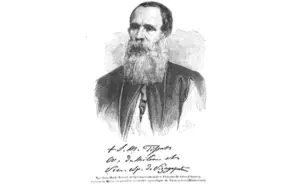
Rt Rev Fr Jean Marie Tissot was the great builder in colonial Vizagapatam. Born 1810, he arrived in India 1845, came to Vizagapatam 1846 and was a Priest with the Missionaries of St Francis de Sale of Annecy, France. Rt Rev JM Tissot was Bishop of Vizagapatam 1886 – 1890. In addition to the building of St Anne’s Cathedral, his achievements extend to the long term lease on the backwaters that is today’s Inner Harbour, he built reclamation embankments, introduced new cultivation techniques and assisted local farmers cultivate parts into paddy fields. Rev Tissot also founded St Aloysius High School, Vizag in1847, built the Fort Convent and St Joseph’s Convent, Waltair, bought the land on Ross Hill and constructed the original Hill Chapel. Rev Tissot enjoyed the patronage of the Maharajah Sir Goday Gajapathi Rao and also the Maharajah of Vizianagram. The local Zamindars actively supported the establishment of Catholic educational institutions for the local boys and the Zamindars wives and daughters actively supported, must against the then practice, the education of Telugu girls.
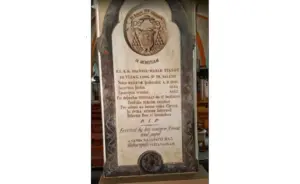
The Madras Catholic Watchman reported in 1889 that … ‘Rev Tissot introduced to Vizagapatam, for the first time, the following: – The tube well; the ice making machine; the sewing machine; the cloth washing machine; the kneading machine; the grinding machine and the kitchen range or stove. The greatest architects of the town were at one time under the training of His Lordship. The superb Cathedral of St Anne is a standing memorial to His Lordship’s skill in architecture; the building is decidedly second to none in this part of the Northern Circars.’
The St Anne’s cathedral structure has been subject to the harshness of the many monsoons and cyclones that have battered Vizag over the years. Perhaps this explains the drab protective tile cladding applied to the cathedrals brick and chunam exterior and the change in some architectural features. One wonders how Vizag’s own Hill Chapel, Waltair Convent and the other great cathedrals in South India have been well restored and maintained to retain their original glory? Has Vizag’s premier Catholic Cathedral been relegated in prominence or has it just been ‘forgotten’?
This article on St Anne’s Cathedral in Vizag has been written by John Castellas whose family belonged to Vizag for 5 generations. Educated at St Aloysius, migrated to Melbourne, Australia in 1966, former General Manager Engineering at Boeing & Qantas Airways, in retirement Lecturers in Aviation Management at Swinburne University and is a Vizag aficionado.


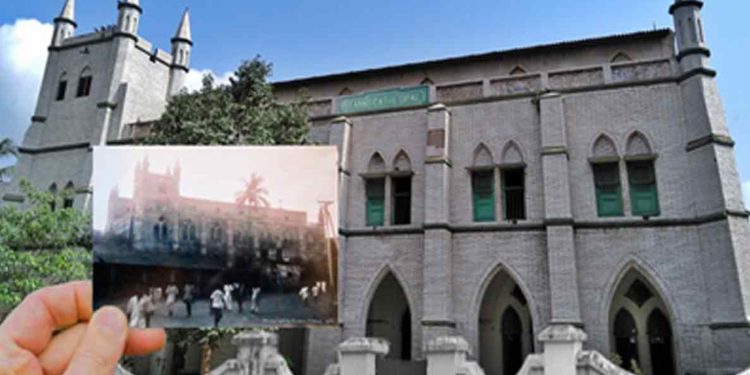







Discussion about this post